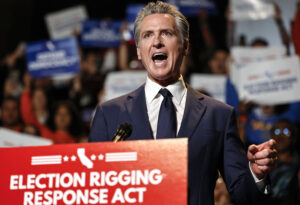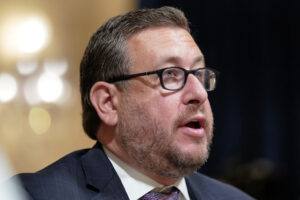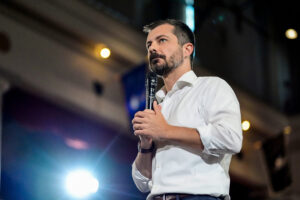Congress
What Trump can — and can’t — do in his bid to take over law enforcement in DC
President Donald Trump’s attempt to take over law enforcement in Washington, D.C., is once again testing the bounds of his authority to militarize a major U.S. city.
The capital, unlike other cities, is already subject to significant federal control — and Trump is invoking his emergency powers to solidify it. But the intersection of complicated laws and rules about the use of the military for domestic law enforcement, the deployment of federal agents to the streets of D.C. and the city’s own crime-fighting policies may still prompt legal uncertainty — and inevitable challenges.
Here’s what Trump can — and cannot — do:
Trump said he’s taking control of the D.C. police. Can he do that?
Yes, with limits. The Home Rule Act gives him the power to use the D.C. police force for “federal purposes” if he determines that there are “special conditions of an emergency nature.”
He can use the D.C. police for up to 48 hours, or for up to 30 days if he sends a special message to the leaders of certain congressional committees.
To use the D.C. police for longer than 30 days, he would need authorization from Congress.
In an order Monday, Trump said the D.C. police force under his control would protect federal buildings and national monuments, typically a function of federal law enforcement agencies.
Trump also said he’s deploying National Guard troops to D.C. Can he do that?
Yes. Trump has more authority over the D.C. National Guard than he has over the guards of the 50 states. Governors control the state guards (although the president can federalize the state guards in an emergency or for use in combat operations). The District of Columbia, of course, has no governor, and the D.C. guard is not controlled by the mayor. Rather, the D.C. guard is always under the direct control of the president.
Aren’t there limits on using the military for domestic law enforcement?
Yes, but those limits might not apply to the D.C. National Guard.
A federal law passed in 1878, the Posse Comitatus Act, bars the use of the U.S. military for civilian law enforcement except when authorized by the Constitution or another provision of federal law.
The Trump administration is currently on trial in Los Angeles over its deployment of the California guard in June to quell immigration-related protests in that city. That trial will test whether a federal judge believes Trump’s deployment ran afoul of that 1878 law and must be rescinded.
But the legality of using the guard in D.C. may be different. Presidential use of the D.C. guard has rarely faced legal resistance because it has typically happened in cooperation with D.C. leaders. And the Justice Department has long maintained that the D.C. guard, unlike the other guards, can be used for ordinary law enforcement without violating Posse Comitatus. A 1989 legal opinion from the department’s Office of Legal Counsel found that President George H.W. Bush could use the D.C. guard to carry out law enforcement missions in D.C. as part of the so-called war on drugs.
If Trump’s deployment of the D.C. guard is challenged in court, a judge would almost certainly take note of the OLC opinion, but would not be bound to follow it.
Does Trump have the power to “federalize” D.C.?
Trump cannot singlehandedly wrest control of the district’s government.
The Constitution grants Congress the power to “exercise exclusive legislation” over the “seat of government” of the United States. In 1973, with the passage of the Home Rule Act, Congress created the local D.C. government that still exists to this day.
Under the act, D.C. has significant control of day-to-day local affairs. But the federal government — including federal law enforcement agencies such as the U.S. Capitol Police and the U.S. Park Police — retain control over federal land and property. And Congress has the final say on local D.C. policies: The Home Rule Act allows Congress to effectively veto any legislation passed by the D.C. Council.
The president alone has no authority to “federalize” the D.C. government; he would need Congress to amend the Home Rule Act.
Has Trump sent federal authorities into D.C. before?
Yes, Trump has tested the boundaries of his ability to use federal agents and the National Guard in Washington.
Trump has clear control and authority over tens of thousands of federal law enforcement officers who work in the area for federal agencies, including the FBI, the Marshals Service, the Secret Service, the Park Police and others. Trump deployed many of those agencies in June 2020 to clear Black Lives Matter protesters from Lafayette Park, across from the White House.
Trump also faced scrutiny for his inaction on Jan. 6, 2021 — as a mob of his supporters attacked the Capitol — when it came to ensuring the National Guard was racing to assist besieged lawmakers. Though Trump aides said he previously authorized them to deploy the National Guard as necessary, witnesses said Trump made no efforts to contact his military leadership during the chaos, even as his then-vice president, Mike Pence, was urgently making calls to ensure a federal response.
Trump on Monday also encouraged D.C. law enforcement officers to hit back “hard” if instigators spit at them and get in their faces. But Trump also pardoned hundreds of people who attacked and injured those very same officers on Jan. 6, sometimes with weapons, and suggested his supporters’ actions were “minor.”
Congress
Trump floats circumventing Congress to maintain control of DC police
President Donald Trump on Wednesday suggested that he could avoid congressional approval to extend his 30-day federal takeover of Washington’s police, amid his efforts to wrest control of the capital’s law enforcement.
Trump this week invoked the Home Rule Act, effectively handing the executive branch control over Washington’s police for up to 30 days. Beyond that, Trump would have to go through Congress for an extension authorization.
But during his speech announcing the 2025 Kennedy Center honorees on Wednesday, Trump repeatedly floated circumventing Congress to maintain his hold over the city’s law enforcement.
“If it’s a national emergency we can do it without Congress, but we expect to be before Congress very quickly,” Trump said.
Trump appeared to be banking on the support of congressional Republicans to push through any attempt to extend the 30 day takeover — but maintained that if lawmakers failed to approve the extension, he would go forward with the move on his own by declaring a national emergency.
“I don’t want to call a national emergency,” Trump said, before adding, “If I have to, I will.”
Trump also announced that he was working with congressional Republicans to put forward a crime bill initially targeted at Washington but intended as a “beacon” for other Democratic cities such as New York, Chicago and Los Angeles.
“We’re going to need a crime bill that we’re going to be putting in, and it’s going to pertain initially to D.C.,” Trump said. “We’re going to be asking for extensions on that, long-term extensions, because you can’t have 30 days.”
California already felt the repercussions of the Trump administration’s targeting earlier this summer, when the president deployed the National Guard to help quell protests against immigration detention sweeps in Los Angeles.
Trump on Monday announced that he was taking control over Washington’s police force and deploying the National Guard to patrol the city’s streets. Citing a rise in violent crime — which local leaders have disputed, pointing to statistics showing the city hitting a 30-year low last year — Trump declared that Monday was “Liberation Day” for the city, and invoked a never-been-used statute of the District of Columbia Home Rule Act allowing the president to take control over the local police in cases of emergency.
So far, D.C. leadership has been playing nice with the president, with Mayor Muriel Bowser calling the move “unsettling and unprecedented” — but still saying the city would comply with Trump’s order.
The president on Wednesday added that he would be “going to Congress for a relatively small amount of money” to “fix up” the nation’s capital, including fixing potholes and getting rid of medians in the city’s roads.
Asked about the prospect of D.C. statehood, which the city’s leaders have long pushed for without success, Trump called the efforts “ridiculous” and “unacceptable,” saying the overwhelmingly blue city would “pick up two senators, and that’s not going to happen.”
Congress
Eleanor Holmes Norton keeps a low profile as Trump takes aim at DC
Washington’s locally elected government is under attack from President Donald Trump and congressional Republicans. But the capital city’s self-proclaimed “warrior on Blue Light News” is nowhere to be seen on the front lines.
Eleanor Holmes Norton, the District of Columbia’s nonvoting House delegate, issued a written statement Monday after Trump seized control of the city’s police force and moved to send in National Guard troops, calling it “counterproductive,” a “historic assault on D.C. home rule” and “more evidence of the urgent need to pass my D.C. statehood bill.”
But Norton — who has represented the city in the House since 1991 — has not been seen in public or otherwise interacted with the media since, even as other elected Democrats stepped forward to defend D.C.’s autonomy against Trump’s aggressive new actions.
Washington Mayor Muriel Bowser held an hourlong news conference Monday afternoon where she was flanked by city public safety officials, but not Norton. Her name was also missing from a joint statement released by members of Congress representing D.C.’s suburbs that slammed the police takeover as a “soft launch of authoritarianism.” Several of those lawmakers have since given interviews to Blue Light News and other outlets.
House Minority Leader Hakeem Jeffries said Tuesday afternoon he had yet to speak to Norton about a response to Trump’s moves, which were announced Monday morning. The New York Democrat said he hoped to have that conversation later in the day.
Norton did not accept an interview request made through a spokesperson, who declined to identify any other interviews or public appearances she has made since Trump escalated his threats against the city late last week.
The spokesperson, Sharon Eliza Nichols, said in a statement that Norton has been “working diligently with Mayor Bowser, city officials and her colleagues discussing how to support the District’s response and prevent further federal incursions against D.C.’s right to handle its own affairs.”
“Congresswoman Norton has proven her dedication to the people of D.C.,” the statement continued. “She understands the unprecedented circumstances the District is in, and her top priority is to ensure that home rule and D.C. residents are protected.”
Norton’s back-seat response to the most serious federal threat to the city’s government in 30 years is out of step with her one-time reputation as a fierce defender of local prerogatives in the face of meddling by federal authorities. Her campaign website still promotes the “warrior” moniker she has used for decades to reflect her often fiery battles with Republicans.
But she is facing mounting questions about her plans to seek a 19th term next year as fellow Democrats privately voice concerns about her fading presence in the House. She has twice told reporters she intends to run again in 2026, but in both instances her staff subsequently said she is undecided.
A campaign spokesperson did not respond to a request for an update on her reelection plans.
A person granted anonymity to describe Norton’s thinking said her low-key approach to the joint statement was in keeping with the more conciliatory approach Bowser and other city officials have taken with Trump in his second term. Norton, the person said, does not want to provoke Trump into escalating his attacks on the D.C. government.
Bowser, however, has appeared on camera multiple times since Trump’s announcement to take questions and defend the city’s public safety efforts, as have some D.C. Council members.
The person said Norton wasn’t invited or notified by the mayor’s office about Bowser’s news conference. Another person granted anonymity to comment on the sensitive situation said it was not standard practice to invite federal officials such as Norton to mayoral news conferences. The mayor’s office declined to comment.
Norton was invited to join the joint statement from the Washington-area House delegation but ultimately did not sign on for strategic reasons, the person said.
Behind the scenes, Norton has been involved in marshalling a response to Trump’s actions beyond her Monday statement. Nichols said she has been “actively reaching out to civic associations and other groups of D.C. residents” and helped organize a Monday evening conference call with Bowser and members of the Congressional Black Caucus.
Norton helped open the conversation, according to four people granted anonymity to discuss the private call, where the lawmakers discussed recent steps taken by the city to address crime.
The CBC occupies a special place in the fight for D.C. voting rights and political autonomy. The group played a key role in securing passage of the Home Rule Act in 1973 creating the city’s locally elected government — one of the caucus’s first major legislative victories following its founding in 1969.
CBC Chair Yvette Clarke (D-N.Y.) said in a Tuesday statement that the group will “continue fighting to protect D.C.’s right to self-governance and we urge all Americans to recognize this for what it is: a test run for broader authoritarian overreach.”
“The stakes are high not just for Washington, D.C., but for the future of democracy in every corner of this country,” Clarke continued.
Most elected Democrats are loath to publicly criticize Norton given her long record of fighting for the city — including during the mid-1990s, when Congress imposed a financial control board to manage most city affairs. Norton was instrumental in pushing through legislation that recalibrated the city’s relationship with Congress and is widely seen as setting the stage for its economic rebirth and population growth over the following two decades.
Many also believe that Trump would have gone after the District regardless of what its elected officials said or did in the lead-up to his announcements Monday. But others contend that, without an actual vote in Congress, the D.C. delegate’s foremost responsibility is to rally support for the city and make the case for its autonomy to the American public.
Kinney Zalesne, a former DNC official who is running against Norton, said in a Tuesday interview that “there’s an opportunity here for the D.C. delegate to be a loud and consistent and powerful and unrelenting voice for D.C. to Congress, to the administration and to the rest of the nation.”
“One or two statements” did not meet that standard, she said: “We need to tell the truth about this federal overreach — that it’s unnecessary, inappropriate and potentially illegal.”
Norton’s Democratic colleagues on Capitol Hill, meanwhile, voiced support — even as some said they had not spoken to her amid this moment of crisis.
“I’m going to continue to support her and D.C., because many of my constituents work in D.C.,” said Rep. Suhas Subramanyam, who represents a district in the Virginia suburbs. “I know people have brought up the issue of her ability to serve. … I haven’t had a problem serving with her.”
Jeffries, speaking to reporters Tuesday in Illinois, said “I have not had a conversation with Delegate Norton as of yet, but have been in communication with Mayor Bowser [and] indicated that we are going to strongly support her efforts to defend the sovereignty and integrity of the District of Columbia.”
“I look forward to connecting with her at some point later on today,” he added later.
Shia Kapos contributed to this report from Springfield, Illinois.
Congress
Chris Murphy goes all in on funding bill boycott as Dems seek bipartisanship
Chris Murphy has been warning for months that voters want Democrats to fight. This summer, the Connecticut senator is picking a battle that puts him at odds with his Democratic colleagues.
Murphy has made surprising moves over the last month to protest bipartisan government funding talks as a member of the Appropriations Committee, demonstrating his vision of what opposition to President Donald Trump should look like and further stoking speculation about his own presidential ambitions.
The third-term senator said in a recent interview that Trump “doesn’t give a fuck what we write” into spending legislation. And so he sees no reason to participate in the drafting of funding bills if the president is going to keep withholding billions of dollars Congress already approved and goading Republican senators to claw back more.
“Every single day, there’s new evidence that our democracy is falling, and you’ve got to take stands. You have to take fights,” Murphy explained. “I just worry — every time that we go along with these appropriations bills, we’re putting a bipartisan veneer of endorsement on an illegal process that’s ultimately part of his campaign to destroy our democracy.”
As the top Democrat on the appropriations panel that funds the Department of Homeland Security, Murphy occupies a role that has historically demanded across-the-aisle collaboration. But in recent weeks, he opposed all spending measures advanced during Senate Appropriations Committee markups for which he was present, challenged his Republican counterpart on the DHS funding bill and voted “no” on the Senate’s first bipartisan funding package of the year.
“I’m nothing if not consistent. I don’t like the position I’m in,” Murphy said. “It’s lonely. 28-to-1 votes are lonely.”
So far, Murphy isn’t slamming his colleagues for embracing bipartisan negotiations, and his peers aren’t directly criticizing his approach. But they aren’t exactly praising him either.
“He has the right to his opinion,” said the top Democratic appropriator in the Senate, Patty Murray of Washington. “And I just have the opinion that the more we can do to get bills done, the better chance we have of getting better things for our country.”
Sen. Brian Schatz of Hawaii, one of Murphy’s friends and another senior member of the Appropriations Committee, said Democrats have a duty to at least attempt to strike a cross-party compromise on federal spending ahead of the Sept. 30 shutdown deadline.
“I’m not his spokesperson,” said Schatz, who is in line to be the chamber’s Democratic whip in the next Congress. “So all I can say is: We’ve been demanding a bipartisan process. So when there’s a step in that direction, I think it’s our obligation to try to be constructive.”
While Murphy has never been a moderate, he has grown rapidly into a liberal firebrand in recent years. Once best known on Capitol Hill for his advocacy for gun control and his foreign policy expertise, he’s now a frequent anti-Trump voice on cable news shows and has waded into controversial social topics like the nation’s “male identity” crisis.
But Murphy’s latest political stand against Trump comes as his name is floated for a bigger-stage battle against Republicans — this time as a presidential contender in 2028.
If the 52-year-old senator seeks the Democratic nomination in three years, his protest of government funding bills could help differentiate him as a candidate who fought the Trump administration with more than just verbal criticism.
“It does fit, right? These are strategies that would make sense if he’s interested in a national platform and to run for office like president,” said Hans Noel, a Georgetown University professor who studies presidential nominations.
“There’s some appeal to a lot of voters — of fighting — especially at the national stage, where he doesn’t have to worry about winning over allies for legislative progress,” Noel continued. “Murphy has been somebody who’s been talking on a national stage for a long time. It’s not completely new. But he’s somebody who’s got that kind of appeal.”
This past week, Murphy spent his birthday at an event with progressives in Arizona, where he talked broadly about the need for Democrats to balance opposition with real policy commitments: “We can’t just be against Donald Trump. We’ve got to give people a vision of something different.”
Since Trump’s election last November, Murphy has grown a beard, announced the end of his 17-year marriage and sparked rumors about romantic ties to a prominent Democratic strategist. In April, he hosted a town hall back in rural North Carolina — more than 500 miles from his blue home state. Then this summer, he launched a PAC aimed at taking on Trump and Republicans in Congress.
Murphy hasn’t always resisted negotiations with Republicans. In 2022, after a gunman left 21 people dead inside a Texas elementary school, he undertook weeks of painstaking talks that resulted in the first significant federal gun-control legislation in two decades. It was the culmination of a nearly decade-long fight for Murphy, who represented Sandy Hook Elementary School in the House at the time of that devastating 2012 shooting.
His next foray into bipartisan talks did not have a happy ending. Last year he scrupulously crafted the high-profile bipartisan border deal with Oklahoma Republican Sen. James Lankford, in an attempt to enact Congress’ first major immigration overhaul in more than three decades. Then Trump chilled Republican support for the bill.
To Murphy, it signaled that Republicans couldn’t be trusted to be good-faith actors in negotiations to fund the government: “I think that drama was early proof that they’re never going to cross him,” he said of Republicans’ loyalty to Trump.
This belief was further cemented when Murphy’s GOP colleagues cleared Trump’s $9 billion rescission request last month targeting public broadcasting and foreign aid.
“They can say that they’re going to honor the words on the page,” Murphy said. Yet if Trump “decides to ignore the law,” he continued, “I just don’t think that my Republican colleagues are going to really fight to protect it.”
Democratic leadership’s interest in engaging in bipartisan funding negotiations, from which Murphy is abstaining, is a relatively new development. Just a month ago, Senate Majority Leader Chuck Schumer penned a lengthy “dear colleague” letter insinuating that his members should cut off cross-party talks if Republicans accepted the White House’s rescissions package.
Nine days later, Senate Republicans banded together to pass that bill. And five days after that, Schumer stood with his House counterpart, Minority Leader Hakeem Jeffries, to announce that Democrats still “want to pursue a bipartisan, bicameral appropriations process.”
It has left Murphy as the lone Democratic appropriator continually opposing the funding bills his colleagues are trying to advance, even as he readily admits it’s not the substance of the spending measures he’s against.
“The bills themselves are good, bipartisan bills,” said Murphy. “It’s just — I don’t believe that anything in there is actually going to be implemented.”
This is the case Murphy said he wants to get through to Sen. Katie Britt, the Alabama Republican who chairs the Homeland Security appropriations panel opposite Murphy. The two lawmakers were seen last month in a heated exchange in the well of the Senate floor after passage of the clawback request. Britt described the conversation, captured by C-SPAN cameras, as “a spirited dialogue,” vowing: “I’ll continue to work in good faith, as I always have.”
Murphy, however, said negotiations on the DHS funding bill will be meaningless if Trump and Republicans are going to undermine the spending directives when the measure becomes law. “We had an animated discussion,” Murphy said of his talk with Britt. “Obviously it’s hard to write a bill when the administration is going to stab you in the back as soon as you write it, especially in a space as difficult as immigration and DHS.”
He pointed to specific examples of how Trump has already undermined appropriators, including the president’s efforts to fund the controversial “Alligator Alcatraz” immigration detention center in Florida by diverting money Congress appropriated for “humane” alternatives to detainment.
“And you know,” Murphy continued, “he’s going to use the money in this budget to treat immigrants like animals.”
Jordain Carney, Katherine Tully-McManus and Cassandra Dumay contributed to this report.
-
Uncategorized9 months ago
Bob Good to step down as Freedom Caucus chair this week
-

 The Josh Fourrier Show9 months ago
The Josh Fourrier Show9 months agoDOOMSDAY: Trump won, now what?
-

 Politics9 months ago
Politics9 months agoWhat 7 political experts will be watching at Tuesday’s debate
-

 Politics9 months ago
Politics9 months agoHow Republicans could foil Harris’ Supreme Court plans if she’s elected
-
Economy9 months ago
Fed moves to protect weakening job market with bold rate cut
-

 Politics9 months ago
Politics9 months agoRFK Jr.’s bid to take himself off swing state ballots may scramble mail-in voting
-

 The Dictatorship6 months ago
The Dictatorship6 months agoPete Hegseth’s tenure at the Pentagon goes from bad to worse
-

 Politics6 months ago
Politics6 months agoFormer ‘Squad’ members launching ‘Bowman and Bush’ YouTube show






